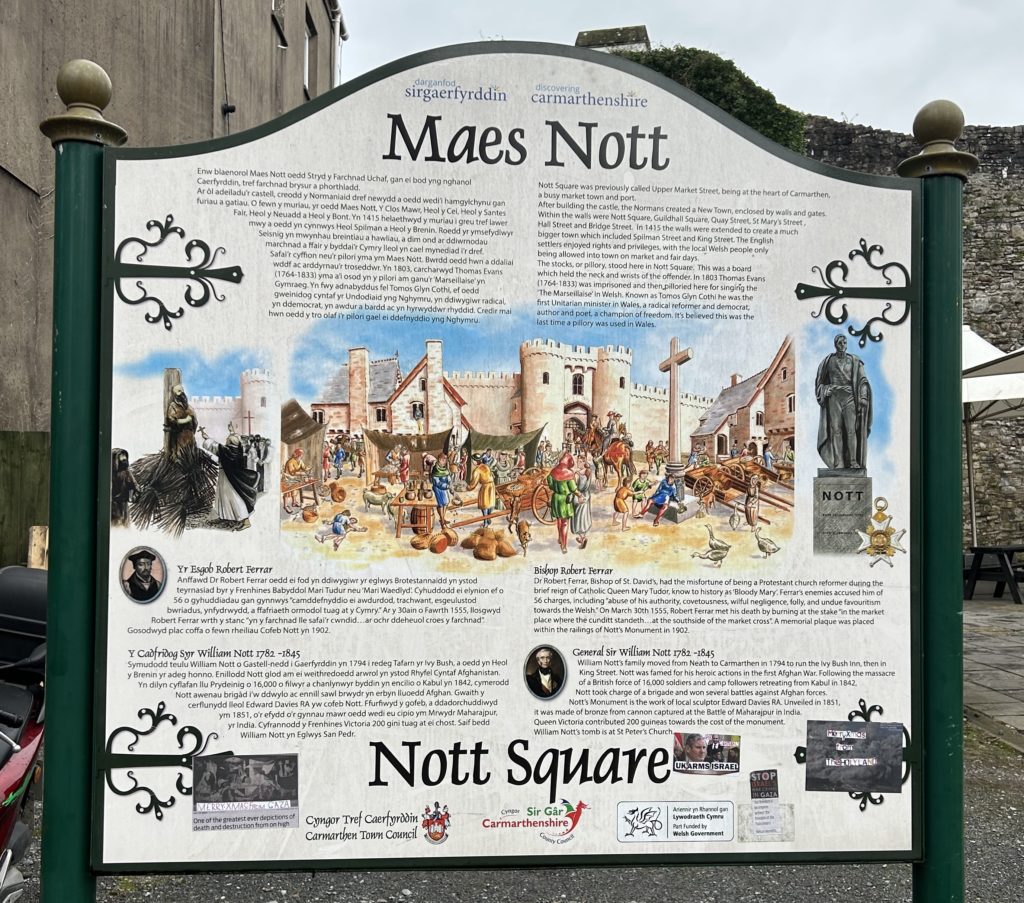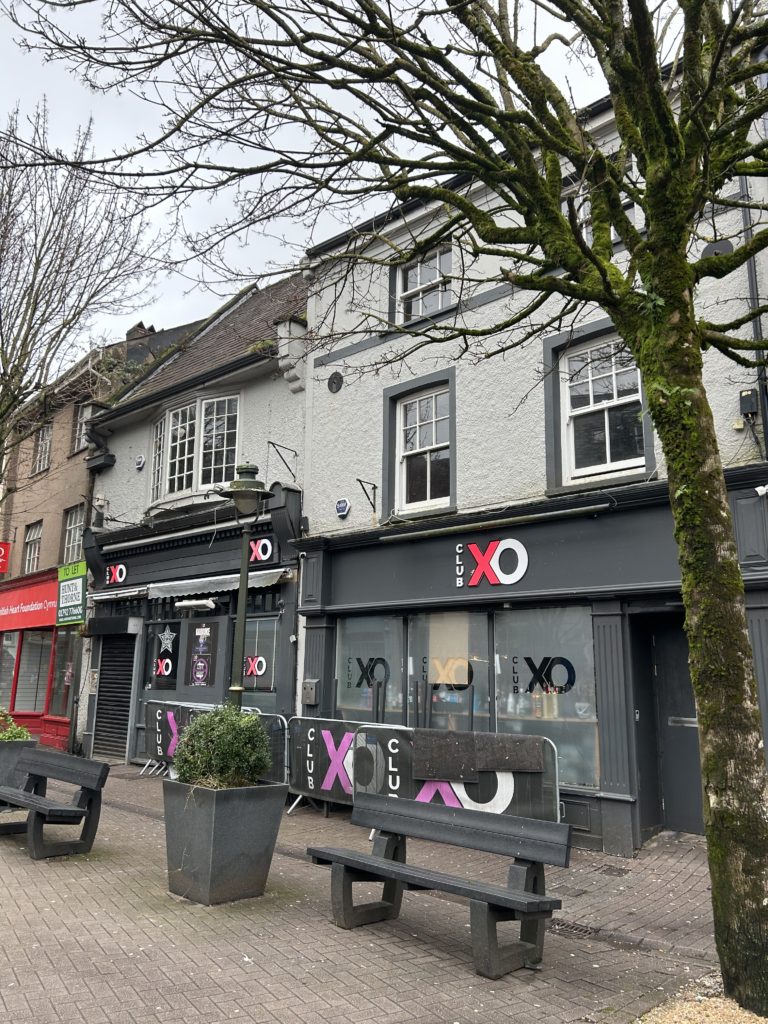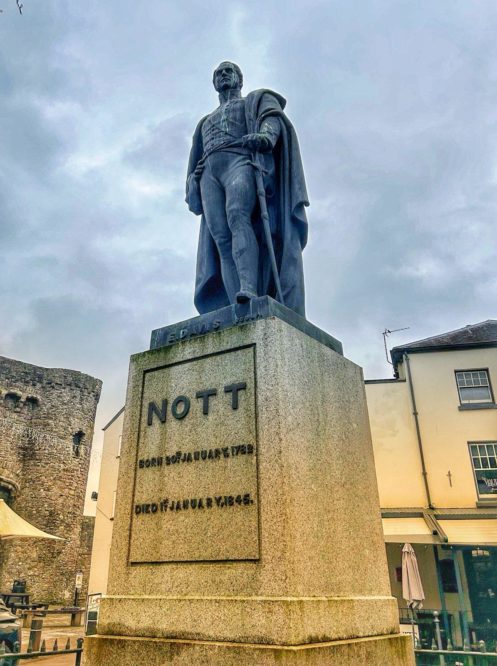Letter from Nott Square, Carmarthen

Amber Bower
It is 2011 and a restaurant has opened on Nott Square, where a statue of Sir. William Nott still stands today. He is an oxidised and cloaked figure leaning on a sword or perhaps it’s a cane.
The restaurant has opened in a building that has had many previous lives. One of those places that seems to have commitment issues towards businesses, and saw them shut down harshly within a year or less.
What was once Property Place Wales, a modest estate agency, has now been bought by an ambitious man with money but little experience in restaurants, wanting to turn his self taught passion for wine and food into a lucrative and inevitably pretentious business.
A few days a week, I wash their dishes and clean their floors, and am given the task of prising open mussels one by one, to check if they are alive or dead. If they are dead, I toss them into a large black bin.
The remaining live mussels, in their ink black cocoons I then transfer to wait for their searing, shallow bath of white wine broth, that steams them slowly to a death on the chef’s own terms.
After around a month of working in the small restaurant kitchen, scrubbing with pruned hands and sneaking small pieces of food from plates when the chef had his back turned, I am upgraded to waitressing.
My pay stays the same, but now I have the exciting task of serving the food that I had watched passing under the heat lamps, to prospective customers.
Starters of lightly nutty Jerusalem artichoke soups, topped with croutons made from the in house bread and a sprinkling of parsley. Chicken liver pate, sat in a white, scallop-edged ramekin, waiting to be smoothed over crostini and united with its confidante of caramelised onion chutney.
Next the mains; individually portioned, round cast iron pans, housing beef bourguignon in all its rich, bubbling red wine glory; meticulously cooked over several hours, accompanied with velvety mash.
A pair of duck breasts glowing from its time spent bathing in orange juice, zest and a lacquering of honey, paired with buttery new potatoes.
I scoop each dish onto the non-slip waitressing tray that is almost a foot and a half in diameter. Resting it on my right shoulder, supported by my right hand, I head for the narrow staircase that leads down to the restaurant floor.
Sir William Nott
Sat in the converted loft of the building that resembles a house, the kitchen also accommodates the tiny office, tucked away at the front, with a bay window.
At the end of my final shift of the week, I gather to hash out my payments of £30 plus tips. The owner is seated counting the hours and the money, whilst I stare out of the bay window towards the statue of Sir. William Nott, namesake of the square.
According to Wikipedia; Sir. William Nott was born in Neath. He fought on behalf of British-India in the First Afghan War. To honour his service, and because he died in the town, his statue sits, grade two listed, in the square.

He had two marriages and five children; one being a daughter named Charlotte who married John Bower and sired a son named John William Nott-Bower.
John William Nott-Bower became a Sir, like his grandfather before him, following in his military path. He joined the King’s Regiment and eventually became commissioner of the Metropolitan Police.
Sir. John William Nott-Bower, with his wife Florence Harrison, had a son named Sir. John Reginald Hornby Nott-Bower.
Sir. John Reginald Hornby Nott-Bower, like his father, was appointed commissioner of the Metropolitan Police in 1953, though apparently, he lacked lustre in the role.
Standing in the curve of the bay window, I think about the Sirs and the Johns and the Williams, the Hornbys and the Reginalds, one succeeding another in a respectably calculable manner. The man hands me my envelope of £74.50; two shifts and £14.50 in tips, a good week.
Thirteen Years Later
As I return to Nott Square thirteen years on, the landscape feels the same but the inhabitants are different. The buildings hold the same shape, the same roofs and the same four walls, but inside are new bars and restaurants and barbers.
In the building where I had my first job, the restaurant has evaporated without a trace of familiarity left behind. In its place; a nightclub called Club XO.
Adjacent to the club I sit on a bench and look up to the bay window where I see a shadow of my younger self. The window pane that was once encased in a forest green border has been painted white, contrasting to the black and grey shop front.
In the daylight it is barren with its darkened windows imposed with large ‘XO’s, repeating, one after another.

Metal fencing is leant against the front, that assembles into a smoking area at night. Sambuca and Sourz cut through my memory of orange roasted duck and beef bourguignon, overpowering the rich smell of the red wine sauce.
Instead of a top floor with a kitchen and an office, with a restaurant downstairs, there is a sticky dance floor with velvet chairs and sleeping strobe lights and a dj booth.
The thick air smells sweet with sweat and daiquiri and the ghost of the UK Top 40 tunes hums from the silent speakers.

I sit on this bench in Sir. William Nott’s shadow, where he still stands towering over me. His frame is elevated by a concrete slab, bordered by a metal fence that this bench is leant against.
I sit on this bench and take in the changing scenery, adapting to the movements of time.
Sir William Nott, the one constant, watches with me.
Support our Nation today
For the price of a cup of coffee a month you can help us create an independent, not-for-profit, national news service for the people of Wales, by the people of Wales.






It’s a sword…believe me…Is that not the forebear of the Nott who let the Falklands fall into Argentinian hands?